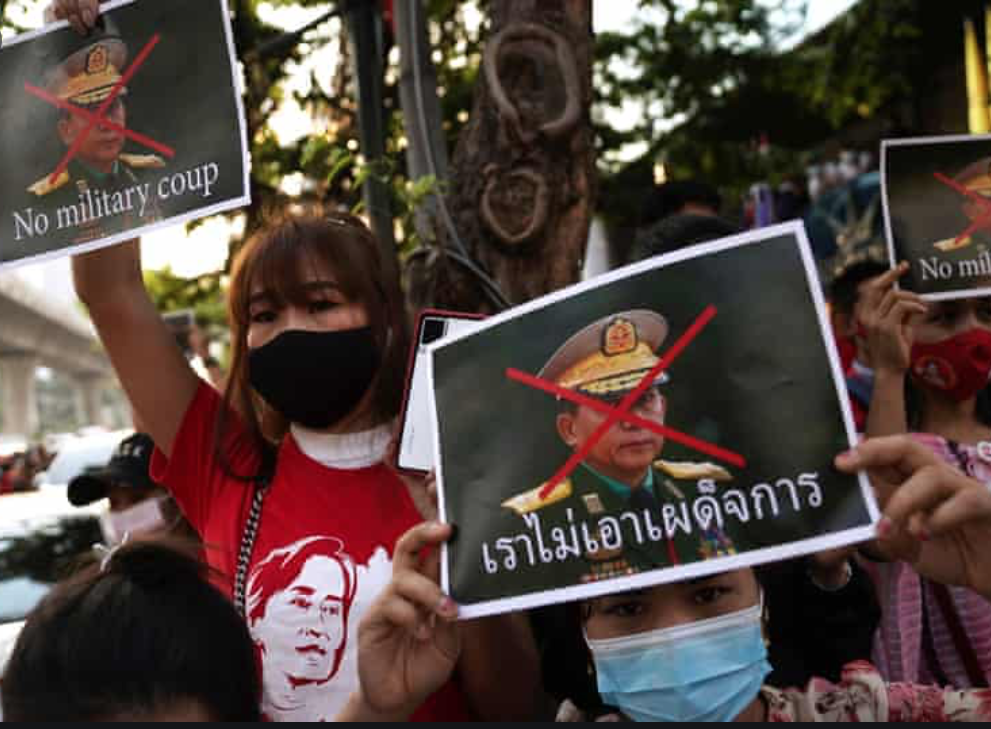Government Cracks Down Across Myanmar As Protests Erupt Following Military Coup

Image Courtesy of The Guardian
By Justin Lamoureux
To many people in other countries, it might seem inconsequential: Disputed election results create a power vacuum for the military to assert its primacy. For the people of Myanmar, however, it represents a much deeper problem: the backsliding of democratic ideals and individual freedoms following over a decade of advancements.
Myanmar’s political climate became exceedingly turbulent following a recent election, in which State Counsellor Aung San Suu Kyi and her respective party – the National League for Democracy (NLD) – received a staggering 83% of the vote. The armed forces, bolstering the opposition, demanded that a second election be held, claiming widespread fraud.
Interestingly, a handful of American social media users drew parallels between the events in Myanmar and former president Donald Trump’s claims of voter fraud in last year’s presidential election. In fact, some claimed the country utilized Dominion Voting Machines: the same electronic vote counting systems that experienced considerable scrutiny in the aftermath of America’s last presidential race. It should be noted that such claims – as well as those made by military officials in Myanmar alleging fraud – were refuted by the country’s election commission.
The military failed to substantiate their doubts regarding the legitimacy of the election results, but disregarded the stance taken by election officials. Using these claims to justify declaring a “national emergency,” armed forces staged a political coup as a new session of parliament was slated to begin; this effectively positions them as the nation’s ruling party for the next year. Despite numerous steps taken toward democracy in recent years, the military has continued to maintain a crucial stake in Myanmar’s government. The Tatmadaw, as it is more commonly known, is delegated a standard 25% of the nation’s parliamentary seats by the constitution.
Military officials also control the defense, interior, and border ministries. What’s more, Myanmar’s constitution explicitly grants the armed forces leeway to seize control of the government when circumstances equating to a state of emergency arise.
Myanmar has a complicated political history. Following nearly half a century of rule by the armed forces, a new government was installed in 2011, and began taking important steps toward civilian rule. Four years later, Aung San Suu Kyi – a longtime political prisoner whose involvement with the nation’s extensive struggle for democracy earned her global recognition – came to power after her party won a landslide victory in the country’s first openly contested election in over a quarter century. During her tenure, however, Suu Kyi’s worldwide popularity would suffer numerous blows. As allegations of genocide against Myanmar’s Rohingya Muslim population have intensified, Suu Kyi has denied that the country’s military has played an active role in said persecution. In 2019, she was summoned before the International Court of Justice to offer testimony, and there was also speculation that Suu Kyi’s Nobel Peace Prize (which she was initially awarded in 1991 for her work advancing “democracy and freedom” in Myanmar) would be rescinded.
Across Myanmar, the abrupt military takeover has been met with a resolutely negative public reception. In multiple cities, tens of thousands have flooded the streets, demanding the release of Aung San Suu Kyi – who, along with most officials belonging to her party, has been placed under house arrest – and the reprisal of democratic rule. Despite large turnouts, civilian protesters have remained largely peaceful. Meanwhile, the new government – headed by career military officer Min Aung Hlaing – has cracked down on civil dissent. Evening curfews have been imposed throughout the country with uniformity, as have bans on motorized processions and gatherings of more than five people. Not to mention, a day-long internet blackout was followed by the complete censorship of social media platforms Instagram and Twitter. Many have likened the current events to the 2007 Saffron Revolution, in which tens of thousands of Buddhist monks and nuns protested the country’s military dictatorship.
On a global level, all these events have received a similarly hostile reception. While neighboring countries such as Cambodia, Thailand, and the Philippines have distanced themselves from the incident – citing it as “an internal matter” – many western countries have condemned the military takeover. The United Kingdom, Australia, and European Union have all issued their own condemnations; UN Secretary-General Antonio Guterres deemed it a “serious blow to democratic reforms.” In a statement released by the White House, President Biden vowed that “the United States will stand up for democracy wherever it is under attack,” and suggested that previously repealed sanctions could be reinstated if the political situation deteriorates further. Needless to say, these events have plunged Myanmar into a highly precarious situation. For starters, progress towards a democratic society has essentially been reversed, and the “tremendously beneficial” discretions rewarded to the military by the current system – such as complete autonomy over both parliament and commercial interests – could make it difficult for a viable opposition to gain traction. The isolation of non-Chinese international partners could also pose a difficult challenge for other countries – such as the United States – who may seek to intervene on behalf of the overthrown democratic regime. The military government has promised to hold a “free and fair” election once the state of emergency expires next year. Whether the relative popularity of Suu Kyi and the NLD is any match for extensive military autonomy is yet to be seen; however, the possibility exists that aforementioned recent events could determine the trajectory of Myanmar’s government for decades to come.






